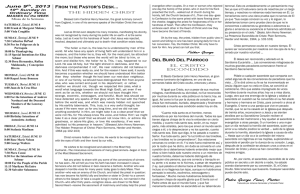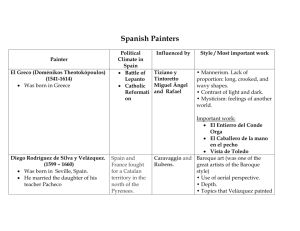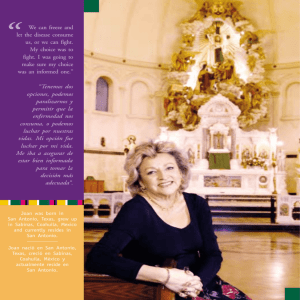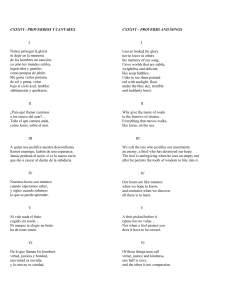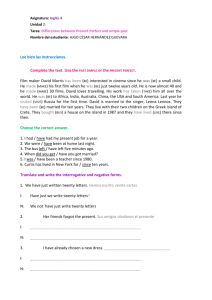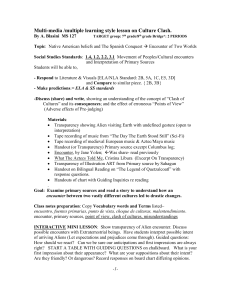Julio Cortázar (1914-1984) La noche boca arriba (Final del juego
advertisement
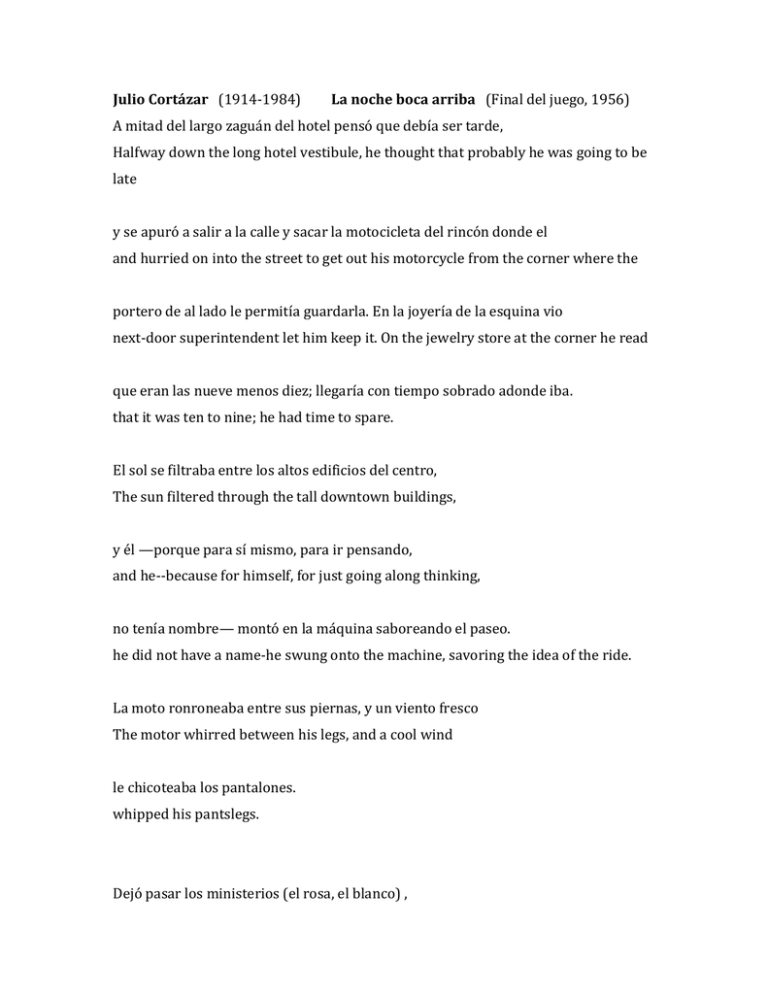
Julio Cortázar (1914-1984) La noche boca arriba (Final del juego, 1956) A mitad del largo zaguán del hotel pensó que debía ser tarde, Halfway down the long hotel vestibule, he thought that probably he was going to be late y se apuró a salir a la calle y sacar la motocicleta del rincón donde el and hurried on into the street to get out his motorcycle from the corner where the portero de al lado le permitía guardarla. En la joyería de la esquina vio next-door superintendent let him keep it. On the jewelry store at the corner he read que eran las nueve menos diez; llegaría con tiempo sobrado adonde iba. that it was ten to nine; he had time to spare. El sol se filtraba entre los altos edificios del centro, The sun filtered through the tall downtown buildings, y él —porque para sí mismo, para ir pensando, and he--because for himself, for just going along thinking, no tenía nombre— montó en la máquina saboreando el paseo. he did not have a name-he swung onto the machine, savoring the idea of the ride. La moto ronroneaba entre sus piernas, y un viento fresco The motor whirred between his legs, and a cool wind le chicoteaba los pantalones. whipped his pantslegs. Dejó pasar los ministerios (el rosa, el blanco) , He let the ministries zip past (the pink, the white), y la serie de comercios con brillantes vitrinas de la calle Central. and a series of stores on the main street, their windows flash-ing. Ahora entraba en la parte más agradable del trayecto, Now he was beginning the most pleasant part of the run, el verdadero paseo: una calle larga, bordeada de árboles, the real ride: a long street bordered with trees, con poco tráfico y amplias villas que dejaban venir los jardines very little traffic, with spacious villas whose gardens hasta las aceras, apenas demarcadas por setos bajos. rambled all the way down to the sidewalks, which were barely indicated by low hedges. Quizá algo distraído, pero corriendo por la derecha como correspondía, se dejó llevar por la tersura, por la leve crispación de ese día apenas empezado. Tal vez su involuntario relajamiento le impidió prevenir el accidente. Cuando vio que la mujer parada en la esquina se lanzaba a la calzada a pesar de las luces verdes, ya era tarde para las soluciones fáciles. Frenó con el pié y con la mano, desviándose a la izquierda; oyó el grito de la mujer, y junto con el choque perdió la visión. Fue como dormirse de golpe. Volvió bruscamente del desmayo. Cuatro o cinco hombres jóvenes lo estaban sacando de debajo de la moto. Sentía gusto a sal y sangre, le dolía una rodilla, y cuando lo alzaron gritó, porque no podía soportar la presión en el brazo derecho. Voces que no parecían pertenecer a las caras suspendidas sobre él, lo alentaban con bromas y seguridades. Su único alivio fue oír la confirmación de que había estado en su derecho al cruzar la esquina. Preguntó por la mujer, tratando de dominar la náusea que le ganaba la garganta. Mientras lo llevaban boca arriba hasta una farmacia próxima, supo que la causante del accidente no tenía más que rasguños en la piernas. «Usté la agarró apenas, pero el golpe le hizo saltar la máquina de costado...» Opiniones, recuerdos, despacio, éntrenlo de espaldas, así va bien, y alguien con guardapolvo dándole de beber un trago que lo alivió en la penumbra de una pequeña farmacia de barrio. La ambulancia policial llegó a los cinco minutos, y lo subieron a una camilla blanda donde pudo tenderse a gusto. Con toda lucidez, pero sabiendo que estaba bajo los efectos de un shock terrible, dio sus señas al policía que lo acompañaba. El brazo casi no le dolía; de una cortadura en la ceja goteaba sangre por toda la cara. Una o dos veces se lamió los labios para beberla. Se sentía bien, era un accidente, mala suerte; unas semanas quieto y nada más. El vigilante le dijo que la motocicleta no parecía muy estropeada. «Natural», dijo él. «Como que me la ligué encima...» Los dos rieron, y el vigilante le dio la mano al llegar al hospital y le deseó buena suerte. Ya la náusea volvía poco a poco; mientras lo llevaban en una camilla de ruedas hasta un pabellón del fondo, pasando bajo árboles llenos de pájaros, cerró los ojos y deseó estar dormido o cloroformado. Pero lo tuvieron largo rato en una pieza con olor a hospital, llenando una ficha, quitándole la ropa y vistiéndolo con una camisa grisácea y dura. Le movían cuidadosamente el brazo, sin que le doliera. Las enfermeras bromeaban todo el tiempo, y si no hubiera sido por las contracciones del estómago se habría sentido muy bien, casi contento. Lo llevaron a la sala de radio, y veinte minutos después, con la placa todavía húmeda puesta sobre el pecho como una lápida negra, pasó a la sala de operaciones. Alguien de blanco, alto y delgado, se le acercó y se puso a mirar la radiografía. Manos de mujer le acomodaron la cabeza, sintió que lo pasaban de una camilla a otra. El hombre de blanco se le acercó otra vez, sonriendo, con algo que le brillaba en la mano derecha. Le palmeó la mejilla e hizo una seña a alguien parado atrás. Como sueño era curioso porque estaba lleno de olores y él nunca soñaba olores. Primero un olor a pantano, ya que a la izquierda de la calzada empezaban las marismas, los tembladerales de donde no volvía nadie. Pero el olor cesó, y en cambio vino una fragancia compuesta y oscura como la noche en que se movía huyendo de los aztecas. Y todo era tan natural, tenía que huir de los aztecas que andaban a caza de hombre, y su única probabilidad era la de esconderse en lo más denso de la selva, cuidando de no apartarse de la estrecha calzada que sólo ellos, los motecas, conocían. Lo que más lo torturaba era el olor, como si aun en la absoluta aceptación del sueño algo se revelara contra eso que no era habitual, que hasta entonces no había participado del juego. «Huele a guerra», pensó, tocando instintivamente el puñal de piedra atravesado en su ceñidor de lana tejida. Un sonido inesperado lo hizo agacharse y quedar inmóvil, temblando. Tener miedo no era extraño, en sus sueños abundaba el miedo. Esperó, tapado por las ramas de un arbusto y la noche sin estrellas. Muy lejos, probablemente del otro lado del gran lago, debían estar ardiendo fuegos de vivac; un resplandor rojizo teñía esa parte del cielo. El sonido no se repitió. Había sido como una rama quebrada. Tal vez un animal que escapaba como él del olor de la guerra. Se enderezó despacio, venteando. No se oía nada, pero el miedo seguía allí como el olor, ese incienso dulzón de la guerra florida. Había que seguir, llegar al corazón de la selva evitando las ciénagas. A tientas, agachándose a cada instante para tocar el suelo más duro de la calzada, dio algunos pasos. Hubiera querido echar a correr, pero los tembladerales palpitaban a su lado. En el sendero en tinieblas, buscó el rumbo. Entonces sintió una bocanada horrible del olor que más temía, y saltó desesperado hacia adelante. —Se va a caer de la cama —dijo el enfermo de al lado—. No brinque tanto, amigazo. Abrió los ojos y era de tarde, con el sol ya bajo en los ventanales de la larga sala. Mientras trataba de sonreír a su vecino, se despegó casi físicamente de la última visión de la pesadilla. El brazo, enyesado, colgaba de un aparato con pesas y poleas. Sintió sed, como si hubiera estado corriendo kilómetros, pero no querían darle mucha agua, apenas para mojarse los labios y hacer un buche. La fiebre lo iba ganando despacio y hubiera podido dormirse otra vez, pero saboreaba el placer de quedarse despierto, entornados los ojos, escuchando el diálogo de los otros enfermos, respondiendo de cuando en cuando a alguna pregunta. Vio llegar un carrito blanco que pusieron al lado de su cama, una enfermera rubia le frotó con alcohol la cara anterior del muslo y le clavó una gruesa aguja conectada con un tubo que subía hasta un frasco lleno de líquido opalino. Un médico joven vino con un aparato de metal y cuero que le ajustó al brazo sano para verificar alguna cosa. Caía la noche, y la fiebre lo iba arrastrando blandamente a un estado donde las cosas tenían un relieve como de gemelos de teatro, eran reales y dulces y a la vez ligeramente repugnantes; como estar viendo una película aburrida y pensar que sin embargo en la calle es peor; y quedarse. Vino una taza de maravilloso caldo de oro oliendo a puerro, a apio, a perejil. Un trocito de pan, más precioso que todo un banquete, se fue desmigajando poco a poco. El brazo no le dolía nada y solamente en la ceja, donde lo habían suturado, chirriaba a veces una punzada caliente y rápida. Cuando los ventanales de enfrente viraron a manchas de un azul oscuro, pensó que no le iba a ser difícil dormirse. Un poco incómodo, de espaldas, pero al pasarse la lengua por los labios resecos y calientes sintió el sabor del caldo, y suspiró de felicidad, abandonándose. Primero fue una confusión, un atraer hacia sí todas las sensaciones por un instante embotadas o confundidas. Comprendía que estaba corriendo en plena oscuridad, aunque arriba el cielo cruzado de copas de árboles era menos negro que el resto. «La calzada», pensó. «Me salí de la calzada.» Sus pies se hundían en un colchón de hojas y barro, y ya no podía dar un paso sin que las ramas de los arbustos le azotaran el torso y las piernas. Jadeante, sabiéndose acorralado a pesar de la oscuridad y el silencio, se agachó para escuchar. Tal vez la calzada estaba cerca, con la primera luz del día iba a verla otra vez. Nada podía ayudarlo ahora a encontrarla. La mano que sin saberlo él aferraba el mango del puñal, subió como el escorpión de los pantanos hasta su cuello, donde colgaba el amuleto protector. Moviendo apenas los labios musitó la plegaria del maíz que trae las lunas felices, y la súplica a la Muy Alta, a la dispensadora de los bienes motecas. Pero sentía al mismo tiempo que los tobillos se le estaban hundiendo despacio en el barro, y al la espera en la oscuridad del chaparral desconocido se le hacía insoportable. La guerra florida había empezado con la luna y llevaba ya tres días y tres noches. Si conseguía refugiarse en lo profundo de la selva, abandonando la calzada mas allá de la región de las ciénagas, quizá los guerreros no le siguieran el rastro. Pensó en los muchos prisioneros que ya habrían hecho. Pero la cantidad no contaba, sino el tiempo sagrado. La caza continuaría hasta que los sacerdotes dieran la señal del regreso. Todo tenía su número y su fin, y él estaba dentro del tiempo sagrado, del otro lado de los cazadores. Oyó los gritos y se enderezó de un salto, puñal en mano. Como si el cielo se incendiara en el horizonte, vio antorchas moviéndose entre las ramas, muy cerca. El olor a guerra era insoportable, y cuando el primer enemigo le saltó al cuello casi sintió placer en hundirle la hoja de piedra en pleno pecho. Ya lo rodeaban las luces, los gritos alegres. Alcanzó a cortar el aire una o dos veces, y entonces una soga lo atrapó desde atrás. —Es la fiebre —dijo el de la cama de al lado—. A mí me pasaba igual cuando me operé del duodeno. Tome agua y va a ver que duerme bien. Al lado de la noche de donde volvía, la penumbra tibia de la sala le pareció deliciosa. Una lámpara violeta velaba en lo alto de la pared del fondo como un ojo protector. Se oía toser, respirar fuerte, a veces un diálogo en voz baja. Todo era grato y seguro, sin ese acoso, sin... Pero no quería seguir pensando en la pesadilla. Había tantas cosas en qué entretenerse. Se puso a mirar el yeso del brazo, las poleas que tan cómodamente se lo sostenían en el aire. Le habían puesto una botella de agua mineral en la mesa de noche. Bebió del gollete, golosamente. Distinguía ahora las formas de la sala, las treinta camas, los armarios con vitrinas. Ya no debía tener tanta fiebre, sentía fresca la cara. La ceja le dolía apenas, como un recuerdo. Se vio otra vez saliendo del hotel, sacando la moto. ¿Quién hubiera pensado que la cosa iba a acabar así? Trataba de fijar el momento del accidente, y le dio rabia advertir que había ahí como un hueco, un vacío que no alcanzaba a rellenar. Entre el choque y el momento en que lo habían levantado del suelo, un desmayo o lo que fuera no le dejaba ver nada. Y al mismo tiempo tenía la sensación de que ese hueco, esa nada, había durado una eternidad. No, ni siquiera tiempo, más bien como si en ese hueco él hubiera pasado a través de algo o recorrido distancias inmensas. El choque, el golpe brutal contra el pavimento. De todas maneras al salir del pozo negro había sentido casi un alivio mientras los hombres lo alzaban del suelo. Con el dolor del brazo roto, la sangre de la ceja partida, la contusión en la rodilla; con todo eso, un alivio al volver al día y sentirse sostenido y auxiliado. Y era raro. Le preguntaría alguna vez al médico de la oficina. Ahora volvía a ganarlo el sueño, a tirarlo despacio hacia abajo. La almohada era tan blanda, y en su garganta afiebrada la frescura del agua mineral. Quizá pudiera descansar de veras, sin las malditas pesadillas. La luz violeta de la lámpara en lo alto se iba apagando poco a poco. Como dormía de espaldas, no lo sorprendió la posición en que volvía a reconocerse, pero en cambio el olor a humedad, a piedra rezumante de filtraciones, le cerró la garganta y lo obligó a comprender. Inútil abrir los ojos y mirar en todas direcciones; lo envolvía una oscuridad absoluta. Quiso enderezarse y sintió las sogas en las muñecas y los tobillos. Estaba estaqueado en el suelo, en un piso de lajas helado y húmedo. El frío le ganaba la espalda desnuda, las piernas. Con el mentón buscó torpemente el contacto con su amuleto, y supo que se lo habían arrancado. Ahora estaba perdido, ninguna plegaria podía salvarlo del final. Lejanamente, como filtrándose entre las piedras del calabozo, oyó los atabales de la fiesta. Lo habían traído al teocalli, estaba en las mazmorras del templo a la espera de su turno. Oyó gritar, un grito ronco que rebotaba en las paredes. Otro grito, acabando en un quejido. Era él que gritaba en las tinieblas, gritaba porque estaba vivo, todo su cuerpo se defendía con el grito de lo que iba a venir, del final inevitable. Pensó en sus compañeros que llenarían otras mazmorras, y en los que ascendían ya los peldaños del sacrificio. Gritó de nuevo sofocadamente, casi no podía abrir la boca, tenía las mandíbulas agarrotadas y a la vez como si fueran de goma y se abrieran lentamente, con un esfuerzo interminable. El chirriar de los cerrojos lo sacudió como un látigo. Convulso, retorciéndose, luchó por zafarse de las cuerdas que se le hundían en la carne. Su brazo derecho, el más fuerte, tiraba hasta que el dolor se hizo intolerable y tuvo que ceder. Vio abrirse la doble puerta, y el olor de las antorchas le llegó antes que la luz. Apenas ceñidos con el taparrabos de la ceremonia, los acólitos de los sacerdotes se le acercaron mirándolo con desprecio. Las luces se reflejaban en los torsos sudados, en el pelo negro lleno de plumas. Cedieron las sogas, y en su lugar lo aferraron manos calientes, duras como bronce; se sintió alzado, siempre boca arriba tironeado por los cuatro acólitos que lo llevaban por el pasadizo. Los portadores de antorchas iban adelante, alumbrando vagamente el corredor de paredes mojadas y techo tan bajo que los acólitos debían agachar la cabeza. Ahora lo llevaban, lo llevaban, era el final. Boca arriba, a un metro del techo de roca viva que por momentos se iluminaba con un reflejo de antorcha. Cuando en vez del techo nacieran las estrellas y se alzara frente él la escalinata incendiada de gritos y danzas, sería el fin. El pasadizo no acababa nunca, pero ya iba a acabar, de repente olería el aire libre lleno de estrellas, pero todavía no, andaban llevándolo sin fin en la penumbra roja, tironeándolo brutalmente, y él no quería, pero cómo impedirlo si le habían arrancado el amuleto que era su verdadero corazón, el centro de la vida. Salió de un brinco a la noche del hospital, al alto cielo raso dulce, a la sombra blanda que lo rodeaba. Pensó que debía haber gritado, pero sus vecinos dormían callados. En la mesa de noche, la botella de agua tenía algo de burbuja, de imagen traslúcida contra la sombra azulada de los ventanales. Jadeó buscando el alivio de los pulmones, el olvido de esas imágenes que seguían pegadas a sus párpados. Cada vez que cerraba los ojos las veía formarse instantáneamente, y se enderezaba aterrado pero gozando a la vez del saber que ahora estaba despierto, que la vigilia lo protegía, que pronto iba a amanecer, con el buen sueño profundo que se tiene a esa hora, sin imágenes, sin nada... Le costaba mantener los ojos abiertos, la modorra era más fuerte que él. Hizo un último esfuerzo, con la mano sana esbozó un gesto hacia la botella de agua; no llegó a tomarla, sus dedos se cerraron en un vacío otra vez negro, y el pasadizo seguía interminable, roca tras roca, con súbitas fulguraciones rojizas, y él boca arriba gimió apagadamente porque el techo iba a acabarse, subía, abriéndose como una boca de sombra, y los acólitos se enderezaban y de la altura una luna menguante le cayó en la cara donde los ojos no querían verla, desesperadamente se cerraban y abrían buscando pasar al otro lado, descubrir de nuevo el cielo raso protector de la sala. Y cada vez que se abrían era la noche y la luna mientras lo subían por la escalinata, ahora con la cabeza colgando hacia abajo, y en lo alto estaban las hogueras, las rojas columnas de humo perfumado, y de golpe vio la piedra roja, brillante de sangre que chorreaba, y el vaivén de los pies del sacrificado que arrastraban para tirarlo rodando por las escalinatas del norte. Con una última esperanza apretó los párpados, gimiendo por despertar. Durante un segundo creyó que lo lograría, porque otra vez estaba inmóvil en al cama, a salvo del balanceo cabeza abajo. Pero olía la muerte, y cuando abrió los ojos vio la figura ensangrentada del sacrificador que venía hacia él con el cuchillo de piedra en la mano. Alcanzó a cerrar otra vez los párpados, aunque ahora sabía que no iba a despertarse, que estaba despierto, que el sueño maravilloso había sido el otro, absurdo como todos los sueños; un sueño en el que había andado por extrañas avenidas de una ciudad asombrosa, con luces verdes y rojas que ardían sin llama ni humo, con un enorme insecto de metal que zumbaba bajo sus piernas. En la mentira infinita de ese sueño también lo habían alzado del suelo, también alguien se le había acercado con un cuchillo en la mano, a él tendido boca arriba, a él boca arriba con los ojos cerrados entre las hogueras. The Night Face Up by Julio Cortazar Halfway down the long hotel vestibule, he thought that probably he was going to be late, and hurried on into the street to get out his motorcycle from the corner where the next-door superintendent let him keep it. On the jewelry store at the corner he read that it was ten to nine; he had time to spare. The sun filtered through the tall downtown buildings, and he--because for himself, for just going along thinking, he did not have a name-he swung onto the machine, savoring the idea of the ride. The motor whirred between his legs, and a cool wind whipped his pantslegs. He let the ministries zip past (the pink, the white), and a series of stores on the main street, their windows flash-ing. Now he was beginning the most pleasant part of the run, the real ride: a long street bordered with trees, very little traffic, with spacious villas whose gardens rambled all the way down to the sidewalks, which were barely indicated by low hedges. A bit inattentive perhaps, but tooling along on the right side of the street, he allowed himself to be carried away by the freshness, by the weightless con-traction of this hardly begun day. This involuntary relaxa-tion, possibly, kept him from preventing the accident. When he saw that the woman standing on the corner had rushed into the crosswalk while he still had the green light, it was already somewhat too late for a simple solu-tion. He braked hard with foot and hand, wrenching him-self to the left; he heard the woman scream, and at the collision his vision went. It was like falling asleep all at once. He came to abruptly. Four or five young men were get-ting him out from under the cycle. He felt the taste of salt and blood, one knee hurt, and when they hoisted him up he yelped, he couldn't bear the presssure on his right arm. Voices which did not seem to belong to the faces hanging above him encouraged him cheerfully with jokes and as-surances. His single solace was to hear someone else con-firm that the lights indeed had been in his favor. He asked about the woman, trying to keep down the nausea which was edging up into his throat. While they carried him face up to a nearby pharmacy, he learned that the cause of the accident had gotten only a few scrapes on the legs. "Nah, you barely got her at all, but when ya hit, the impact made the machine jump and flop on its side . . ." Opinions, recollections of other smashups, take it easy, work him in shoulders first, there, that's fine, and someone in a dust-coat giving him a swallow of something soothing in the shadowy interior of the small local pharmacy. Within five minutes the police ambulance arrived, and they lifted him onto a cushioned stretcher. It was a relief for him to be able to lie out flat. Completely lucid, but real-izing that he was suffering the effects of a terrible shock, he gave his information to the officer riding in the am-bulance with him. The arm almost didn't hurt; blood dripped down from a cut over the eyebrow all over his face. He licked his lips once or twice to drink it. He felt pretty good, it had been an accident, tough luck; stay quiet a few weeks, nothing worse. The guard said that the motorcycle didn't seem badly racked up. "Why should it," he replied. "It all landed on top of me." They both laughed, and when they got to the hospital, the guard shook his hand and wished him luck. Now the nausea was coming back little by little; meanwhile they were pushing him on a wheeled stretcher toward a pavilion further back, rolling along under trees full of birds, he shut his eyes and wished he were asleep or chloroformed. But they kept him for a good while in a room with that hospital smell, filling out a form, getting his clothes off, and dressing him in a stiff, greyish smock. They moved his arm carefully, it didn't hurt him. The nurses were constantly making wise-cracks, and if it hadn't been for the stomach contractions he would have felt fine, almost happy. They got him over to X-ray, and twenty minutes later, with the still-damp negative lying on his chest like a black tombstone, they pushed him into surgery. Someone tall and thin in white came over and began to look at the X-rays. A woman's hands were arranging his head, he felt that they were moving him from one stretcher to another. The man in white came over to him again, smiling, some- thing gleamed in his right hand. He patted his cheek and made a sign to someone stationed behind. It was unusual as a dream because it was full of smells, and he never dreamt smells. First a marshy smell, there to the left of the trail the swamps began already, the quaking bogs from which no one ever returned. But the reek lifted, and instead there came a dark, fresh composite fragrance, like the night under which he moved, in flight from the Aztecs. And it was all so natural, he had to run from the Aztecs who had set out on their manhunt, and his sole chance was to find a place to hide in the deepest part of the forest, taking care not to lose the narrow trail which only they, the Motecas, knew. What tormented him the most was the odor, as though, notwithstanding the absolute acceptance of the dream, there was something which resisted that which was not habitual, which until that point had not participated in the game. "It smells of war," he thought, his hand going instinctively to the stone knife which was tucked at an angle into his girdle of woven wool. An unexpected sound made him crouch suddenly stock-still and shaking. To be afraid was nothing strange, there was plenty of fear in his dreams. He waited, covered by the branches of a shrub and the starless night. Far off, probably on the other side of the big lake, they'd be lighting the bivouac fires; that part of the sky had a reddish glare. The sound was not repeated. It had been like a broken limb. Maybe an animal that, like himself, was escaping from the smell of war. He stood erect slowly, sniffing the air. Not a sound could be heard, but the fear was still following, as was the smell, that cloying incense of the war of the blossom. He had to press forward, to stay out of the bogs and get to the heart of the forest. Groping uncertainly through the dark, stoop-ing every other moment to touch the packed earth of the trail, he took a few steps. He would have liked to have broken into a run, but the gurgling fens lapped on either side of him. On the path and in darkness, he took his bear-ings. Then he caught a horrible blast of that foul smell he was most afraid of, and leaped forward desperately. "You're going to fall off the bed," said the patient next to him. "Stop bouncing around, old buddy." He opened his eyes and it was afternoon, the sun al-ready low in the oversized windows of the long ward. While trying to smile at his neighbor, he detached himself almost physically from the final scene of the nightmare. His arm, in a plaster cast, hung suspended from an appa-ratus with weights and pulleys. He felt thirsty, as though he'd been running for miles, but they didn't want to give him much water, barely enough to moisten his lips and make a mouthful. The fever was winning slowly and he would have been able to sleep again, but he was enjoying the pleasure of keeping awake, eyes half-closed, listening to the other patients' conversation, answering a question from time to time. He saw a little white pushcart come up beside the bed, a blond nurse rubbed the front of his thigh with alcohol and stuck him with a fat needle connected to a tube which ran up to a bottle filled with a milky, opales-cent liquid. A young intern arrived with some metal and leather apparatus which he adjusted to fit onto the good arm to check something or other. Night fell, and the fever went along dragging him down softly to a state in which things seemed embossed as through opera glasses, they were real and soft and, at the same time, vaguely distaste-ful; like sitting in a boring movie and thinking that, well, still, it'd be worse out in the street, and staying. A cup of a marvelous golden broth came, smelling of leeks, celery and parsley. A small hunk of bread, more precious than a whole banquet, found itself crumbling lit-tle by little. His arm hardly hurt him at all, and only in the eyebrow where they'd taken stitches a quick, hot pain siz-zled occasionally. When the big windows across the way turned to smudges of dark blue, he thought it would not be difficult for him to sleep. Still on his back so a little un-comfortable, running his tongue out over his hot, too-dry lips, he tasted the broth still, and with a sigh of bliss, he let himself drift off. First there was a confusion, as of one drawing all his sensations, for that moment blunted or muddled, into himself. He realized that he was running in pitch dark-ness, although, above, the sky criss-crossed with treetops was less black than the rest. "The trail," he thought, "I've gotten off the trail." His feet sank into a bed of leaves and mud, and then he couldn't take a step that the branches of shrubs did not whiplash against his ribs and legs. Out of breath, knowing despite the darkness and silence that he was surrounded, he crouched down to listen. Maybe the trail was very near, with the first daylight he would be able to see it again. Nothing now could help him to find it. The hand that had unconsciously gripped the haft of the dagger climbed like a fen scorpion up to his neck where the protecting amulet hung. Barely moving his lips, he mumbled the supplication of the corn which brings about the beneficent moons, and the prayer to Her Very High-ness, to the distributor of all Motecan possessions. At the same time he felt his ankles sinking deeper into the mud, and the waiting in the darkness of the obscure grove of live oak grew intolerable to him. The war of the blossom had started at the beginning of the moon and had been going on for three days and three nights now. If he man-aged to hide in the depths of the forest, getting off the trail further up past the marsh country, perhaps the warriors wouldn't follow his track. He thought of the many prison-ers they'd already taken. But the number didn't count,only the consecrated period. The hunt would continue until the priests gave the sign to return. Everything had its number and its limit, and it was within the sacred period, and he on the other side from the hunters. He heard the cries and leaped up, knife in hand. As if the sky were aflame on the horizon, he saw torches mov-ing among the branches, very near him. The smell of war was unbearable, and when the first enemy jumped him, leaped at his throat, he felt an almost-pleasure in sinking the stone blade flat to the haft into his chest. The lights were already around him, the happy cries. He managed to cut the air once or twice, then a rope snared him from behind. "It's the fever," the man in the next bed said. "The same thing happened to me when they operated on my duode-num. Take some water, you'll see, you'll sleep all right." Laid next to the night from which he came back, the tepid shadow of the ward seemed delicious to him. A vio-let lamp kept watch high on the far wall like a guardian eye. You could hear coughing, deep breathing, once in a while a conversation in whispers. Everything was pleas-ant and secure, without the chase, no . . . But he didn't want to go on thinking about the nightmare. There were lots of things to amuse himself with. He began to look at the cast on his arm, and the pulleys that held it so com-fortably in the air. They'd left a bottle of mineral water on the night table beside him. He put the neck of the bottle to his mouth and drank it like a precious liqueur. He could now make out the different shapes in the ward, the thirty beds, the closets with glass doors. He guessed that his fever was down, his face felt cool. The cut over the eye-brow barely hurt at all, like a recollection. He saw himself leaving the hotel again, wheeling out the cycle. Who'd have thought that it would end like this? He tried to fix the moment of the accident exactly, and it got him very angry to notice that there was a void there, an emptiness he could not manage to fill. Between the impact and the mo-ment that they picked him up off the pavement, the pass-ing out or what went on, there was nothing he could see. And at the same time he had the feeling that this void, this nothingness, had lasted an eternity. No, not even time, more as if, in this void, he had passed across some-thing, or had run back immense distances. The shock, the brutal dashing against the pavement. Anyway, he had felt an immense relief in coming out of the black pit while the people were lifting him off the ground. With pain in the broken arm, blood from the split eyebrow, contusion on the knee; with all that, a relief in returning to daylight, to the day, and to feel sustained and attended. That was weird. Someday he'd ask the doctor at the office about that. Now sleep began to take over again, to pull him slowly down. The pillow was so soft, and the coolness of the mineral water in his fevered throat. The violet light of the lamp up there was beginning to get dimmer and dim-mer. As he was sleeping on his back, the position in which he came to did not surprise him, but on the other hand the damp smell, the smell of oozing rock, blocked his throat and forced him to understand. Open the eyes and look in all directions, hopeless. He was surrounded by an absolute darkness. Tried to get up and felt ropes pinning his wrists and ankles. He was staked to the ground on a floor of dank, icy stone slabs. The cold bit into his naked back, his legs. Dully, he tried to touch the amulet with his chin and found they had stripped him of it. Now he was lost, no prayer could save him from the final . . . From afar off, as though filtering through the rock of the dungeon, he heard the great kettledrums of the feast. They had carried him to the temple, he was in the underground cells of Teo-calli itself, awaiting his turn. He heard a yell, a hoarse yell that rocked off the walls. Another yell, ending in a moan. It was he who was screaming in the darkness, he was screaming because he was alive, his whole body with that cry fended off what was coming, the inevitable end. He thought of his friends filling up the other dungeons, and of those already walk-ing up the stairs of the sacrifice. He uttered another choked cry, he could barely open his mouth, his jaws were twisted back as if with a rope and a stick, and once in a while they would open slowly with an endless exertion, as if they were made of rubber. The creaking of the wooden latches jolted him like a whip. Rent, writhing, he fought to rid himself of the cords sinking into his flesh. His right arm, the strongest, strained until the pain became unbear-able and he had to give up. He watched the double door open, and the smell of the torches reached him before the light did. Barely girdled by the ceremonial loincloths, the priests' acolytes moved in his direction, looking at him with contempt. Lights reflected off the sweaty torsos and off the black hair dressed with feathers. The cords went slack, and in their place the grappling of hot hands, hard as bronze; he felt himself lifted, still face up, and jerked along by the four acolytes who carried him down the pas-sageway. The torchbearers went ahead, indistinctly light-ing up the corridor with its dripping walls and a ceiling so low that the acolytes had to duck their heads. Now they were taking him out, taking him out, it was the end. Face up, under a mile of living rock which, for a succession of moments, was lit up by a glimmer of torchlight. When the stars came out up there instead of the roof and the great terraced steps rose before him, on fire with cries and dances, it would be the end. The passage was never going to end, but now it was beginning to end, he would see sud-denly the open sky full of stars, but not yet, they trundled him along endlessly in the reddish shadow, hauling him roughly along and he did not want that, but how to stop it if they had torn off the amulet, his real heart, the life-center. In a single jump he came out into the hospital night, to the high, gentle, bare ceiling, to the soft shadow wrapping him round. He thought he must have cried out, but his neighbors were peacefully snoring. The water in the bottle on the night table was somewhat bubbly, a translucent shape against the dark azure shadow of the windows. He panted, looking for some relief for his lungs, oblivion for those images still glued to his eyelids. Each time he shut his eyes he saw them take shape instantly, and he sat up, completely wrung out, but savoring at the same time the surety that now he was awake, that the night nurse would answer if he rang, that soon it would be daybreak, with the good, deep sleep he usually had at that hour, no im-ages, no nothing . . . It was difficult to keep his eyes open, the drowsiness was more powerful than he. He made one last effort, he sketched a gesture toward the bottle of water with his good hand and did not manage to reach it, his fingers closed again on a black emptiness, and the passageway went on endlessly, rock after rock, with momentary ruddy flares, and face up he choked out a dull moan because the roof was about to end, it rose, was opening like a mouth of shadow, and the acolytes straightened up, and from on high a waning moon fell on a face whose eyes wanted not to see it, were closing and opening desperately, trying to pass to the other side, to find again the bare, protecting ceiling of the ward. And every time they opened, it was night and the moon, while they climbed the great terraced steps, his head hanging down backward now, and up at the top were the bonfires, red columns of perfumed smoke, and suddenly he saw the red stone, shiny with the blood dripping off it, and the spinning arcs cut by the feet of the victim whom they pulled off to throw him rolling down the north steps. With a last hope he shut his lids tightly, moaning to wake up. For a second he thought he had gotten there, because once more he was immobile in the bed, except that his head was hanging down off it, swinging. But he smelled death, and when he opened his eyes he saw the bloodsoaked fig-ure of the executioner-priest coming toward him with the stone knife in his hand. He managed to close his eyelids again, although he knew now he was not going to wake up, that he was awake, that the marvelous dream had been the other, absurd as all dreams are-a dream in which he was going through the strange avenues of an astonishing city, with green and red lights that burned without fire or smoke, on an enormous metal insect that whirred away between his legs. In the infinite he of the dream, they had also picked him up off the ground, some-one had approached him also with a knife in his hand, approached him who was lying face up, face up with his eyes closed between the bonfires on the steps.
![3 war poetry wwii.CWK [v6.0]](http://s3.studylib.net/store/data/008813959_1-58f1f7d299afe9d284a6e988e1aa53fe-300x300.png)
